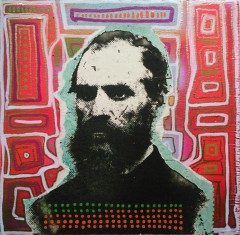Fiction Dan Klen — December 18, 2012 14:08 — 0 Comments
For Seven Days – Dan Klen
He stayed at the guesthouse on the other side of the poppy field. She watched him walk down the dirt path in the early mornings, after she had cut and fried potatoes for her father and younger brother. She watched from the corner of the barn, from behind the cypress tree—dying from a boring longhorn beetle. He would go to the edge of the farm, near the creek. Setting up an easel in the shade, he would paint.
The painter worked on the same canvas everyday of the week. It was one, her father had said, the painter had made and stretched himself. He worked on his subject, a solitary oak tree on the creek bank, with one brush.
On the sixth day, in the afternoon, she pushed open the kitchen door of the guesthouse. In one hand, she held four yellow-red tomatoes by the green vine, their color getting ready to peak. Her other hand, sweaty and empty, she wiped below the peach-colored ribbon tied around her waist. She heard him walking around upstairs, and the wood creaked where his footsteps made the planks bend. Her father had built the house by hand. It wasn’t large, and the plucked rhythm of guitar strings made its way into the kitchen. Slipping off her flats at the bottom of the stairs, she crouched her way up.
She heard words coming from the bedroom, tilting her head around the doorframe. A woman’s voice sang, dry and longing, from a stereo like the poppy fields that summer in the July sun. It had not rained for three weeks.
As she watched him pull his shirt off—he had returned not too long ago from painting all morning—she could tell he only heard the music. He stood at the window, facing out towards the sea miles away. The white shutters pushed out, the wind blew in past him and she could smell his sweat while he took off the rest of his clothes. There were scratches on his upper back, around his shoulders. There was a bruise on his lower side. Without his clothes, his easel, he seemed small like her, like he was retreating from the outside world by shedding layers.
He began to turn away from the open window. She turned her bare feet on the unpolished floor, held her back against the wall and her flats against her chest. The song began to end. He fell on the bed, and she heard him moving a hand back and forth along the sheets like he was retracing the way he had moved a brush.
The next day, after the painter had left, she went to the guesthouse to clean up the bedroom. She found everything neat. So neat that it almost looked like no one was ever there, except the pillows were on the end of the bed where the feet should go. And there was the painting of the oak tree hanging next to the window, now closed. He must have finished it when she had gone into town that morning. She walked closer, noticing something different, something added. There was a person crouching under the tree, dipping both hands into the water. His brush strokes made it difficult to be certain, but it looked like a small woman in a white dress.
All the limbs of the trees seemed to curl above the woman in the painting, giving their shade over the water where she wanted to wash her face. The farm girl wanted to reach out and run her finger over her, stopping herself just before her skin touched the oil. If it wasn’t for the woman’s hair, red as the poppy petals in the evening sun, it could have been her.
The answer isn't poetry, but rather language
- Richard Kenney



